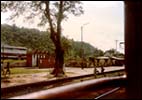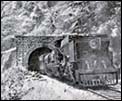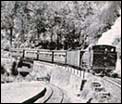Chugging into Chota Nagpur
... the oddball rail lines around Ranchi
Bill Aitken
 Marshalling yards are not everyone's idea of aesthetic bliss and
most passengers who clear Mughal Sarai -- claimed to be the world's
biggest - heave a sigh of relief. To the modern railwayman marshalling
yards are anathema, symbolising wasted time, space and energy. Marshalling yards are not everyone's idea of aesthetic bliss and
most passengers who clear Mughal Sarai -- claimed to be the world's
biggest - heave a sigh of relief. To the modern railwayman marshalling
yards are anathema, symbolising wasted time, space and energy.
It was hardly surprising therefore that the hotel manager, on
asking how I would spend the second day in Ranchi, assuming I would
join a tour to visit the lovely cascading waterfalls of Jharkhand,
looked askance when I told him I would spend today as I had spent
yesterday -- watching the trains shunting from his roof. One could
almost hear his mind ticking, asking the question "What is
silly and rhymes with shunt?"
By a delightful fluke of history the "Ranchi and Chota Nagpur
Plateau' lines -- as they were once referred to -- were commissioned
on the understanding that they would eventually be worked up to
the standard of the Satpura lines also run by the Bengal Nagpur
Railway around Nagpur.
The Satpura lines -- on a width of 2'6" --
represent the longest system of narrow gauge railway in the world
and were built primarily to tap the forest wealth of the bamboo
range south of the Narmada. The Ranchi lines claimed to cull the
iron ore at Lohardaga. To work the gradients of the Satpuras a
handsome, no-nonsense ZE locomotive was devised with an extra
set of driving wheels to give her a more rugged look than the
feminine ZB -- adequate for the Gujarat tracts north of the Narmada.
 To my considerable satisfaction, I discovered steaming heavily
around Ranchi's yard, several ZE locos which had recently been
sent up from the Nagpur Motibagh shed when the Satpura lines had
turned to diesel traction. By good fortune I had visited the Satpura
system first and had been able to see some of the old numbers
on view in Ranchi, flying different colours (and numbers) under
their former allotment. To my considerable satisfaction, I discovered steaming heavily
around Ranchi's yard, several ZE locos which had recently been
sent up from the Nagpur Motibagh shed when the Satpura lines had
turned to diesel traction. By good fortune I had visited the Satpura
system first and had been able to see some of the old numbers
on view in Ranchi, flying different colours (and numbers) under
their former allotment.
The ZE was an improved version of the
original B class 2-8-2 via the BC (where the C signified
conversion to superheating and BS (where the S signified that the
superheating was in built !!) Long-boilered with shuttered cab and
a sturdy smoke-stack ahead of capacious steam domes, no one could
be faulted for thinking the B in their classification indicated
very British profile.
The station master told me that the last of the North British
built "BC" class had been sent down the line to Hatia
for scrapping. I rushed along to the goods yard to try and get
a photograph, but too late. The pounding hammers of a contractor's
gang can demolish the biggest engine into shards within hours
of setting-to with sledge hammers.
When I returned to the Ranchi
overbridge my heart skipped a beat when I discovered a forgotten,
cannibalized steamer tucked away by the wall. Her simple lines
were deceptive; but instead of answering to the call of an ancient
find she turned out to be a ZE of 1927 vintage stripped of her
fittings.
 By a quirk of fate the station master was wrong about
the last of the class being ground to dust. I saw one at Kosi
barrage in Nepal (sold to the country in 1958.) I nearly fell
off my motorbike to see such an unlikely survivor from the 1908
come into view, but was unable to photograph her for the excellent
reason that the barrage was manned by extremely tough security
guards whose weaponry was as advanced as the old steamer was obsolete.
No one can photograph a dam in the sub-continent without dislodging
a ton of bricks on his head. By a quirk of fate the station master was wrong about
the last of the class being ground to dust. I saw one at Kosi
barrage in Nepal (sold to the country in 1958.) I nearly fell
off my motorbike to see such an unlikely survivor from the 1908
come into view, but was unable to photograph her for the excellent
reason that the barrage was manned by extremely tough security
guards whose weaponry was as advanced as the old steamer was obsolete.
No one can photograph a dam in the sub-continent without dislodging
a ton of bricks on his head.
Strangely the branch line to Lohardaga came later in 1913. The
original line ran from Purulia to Ranchi and was opened in 1907.
More strangely 89 kilometres of its track was hooked up and replaced
by broad gauge in 1960.
Courtesy Sanctuary Features
|

